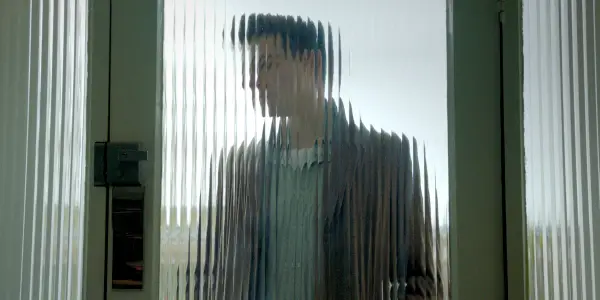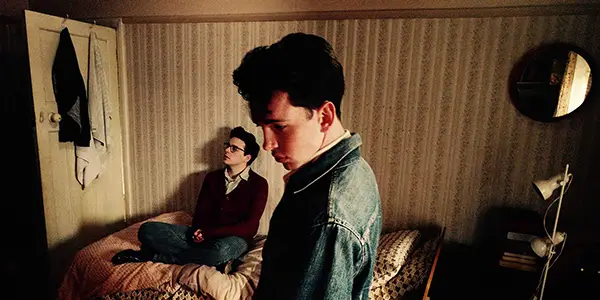ENGLAND IS MINE: Fact & Fiction Conspire

I'm a writer, artist and teacher based in Manchester, England.…
England is Mine focuses on the life of singer and controversial icon Morrissey in the years preceding his initial fame and success as frontman of The Smiths. Directed by Mark Gill, an Oscar and BAFTA nominee of Mancunian origin, expectations are high for this cinematic endeavour. Anticipating this release for some time, I wondered which perspective on Morrissey’s life this would take, and where the film would be placed on the spectrum of fact and fiction.
The Man and The Myth
Baudrillard wrote that Disneyland was created to prove America is real. Legal action was taken against the author David Peace for his ‘creative non-fiction’ take on football manager Brian Clough, memorably played by Michael Sheen, for The Damned United. One defence in such battles between fact and fiction is that when it comes to biography, multiple and often conflicting narratives emerge.
Tried by media and sometimes settled, financially at least, in court, the line between fact and fiction is always blurred. Like all myths, this account is based on glimpses, sightings, and reports. It has been said that in his pre-fame years, Morrissey was always just disappearing around the next corner; but is England Is Mine strong enough to affirm, deny, or enhance the myth?

Morrissey’s high-profile tenure in the public-eye, from the mid ’80s to the present day, has been characterised by debate over the truth behind many of his actions and intentions, yet England Is Mine focuses on arguably the least controversial aspect of his life so far. In a broad sense, it tallies well with his own highly detailed memoir Autobiography, published in 2013. To those who have eagerly read the interviews and articles over the last few decades, Gill’s portrait of the man, his associates and life in those times will undoubtedly appear convincingly accurate. Who could really adjudicate between the merits of Morrissey’s own direct input (absent from the film) and the many people Gill consulted who were part of that late ’70s/early ’80s scene anyway?
A Broader Appeal
The question then becomes whether the film works on its own internal logic and how it stands up as a piece of cinema. In recent interviews, Jack Lowden, utterly embodying the awkward, reserved young man whose creative desires are initially frustrated in search of an outlet, claims that Gill advised against reading autobiographical material. Instead, admirably, the focus was on presenting an angst-ridden youth, alienated from his immediate surroundings, feeling freakish for daring to aspire to an artistic life beyond the working class confines of a post-industrial city.
If not an entirely universal theme, it’s certainly an angle that is rich in material yet neglected in cinema. That is certainly to Gill’s credit. Currently, in the UK at least, as university fees rise and the enormous pressure to work longer hours just to keep one’s head above water mounts, the role of class as a barrier to artistic endeavour, not to mention representation of different social classes in the arts themselves, is a live and contentious topic. With social mobility at a low, this film is most timely.
Growing Up With Morrissey
It also feels timely in the sense of an end of era aspect, pervading Morrissey’s cultural and physical existence at the moment. In contrast to Lowden’s admissions, Morrissey is that alienated antihero whom many of us have grown up with, from parental home, to bedsit and beyond. Yet with the publication of his memoir, a poorly received novel, increasing periods of time between recording contracts, cancelled shows and cancer scares, many erstwhile fans harken back to the early days when he offered a sense of hope and understanding.

England Is Mine culminates with the fabled meeting of Morrissey and Marr, about to make musical history. This period is of interest because it is formative. It’s intriguing because we want to know how like us he might have been before the fame, the court cases, the fractious press relations and controversial political accusations. We know about Morrissey but we’re fascinated by Steven.
Steven At The Centre
Steven appears as the core around which this film spins. Other figures in its orbit are Linder Sterling played with real conviction by Jessica Brown Findlay, his friend Anji and members of the Morrissey family, significantly his mother, played by Simone Kirby. Touchstone events are referred to such as the famous Sex Pistols gig at the Manchester Lesser Free Trade Hall, Steven’s letters published in the NME and his brief involvement with Billy Duffy’s Nosebleeds. The critic and musical entrepreneur Paul Morley even gets a mention in a printed review, yet all of these events and people of note are operating at arm’s length from Steven. He’s there at the eye of the cultural storm and yet it revolves around him, leaving him isolated at its centre.
Lowden’s Steven says little throughout the film. We are presented with a young man trapped by his own ambitions, unable to communicate his desires and to truly be himself, hampered as he is by the mundanity of an office job and then a stint as a hospital porter. It is a heartwarming story insofar as the journey he takes is transformative and ends on a high note after hope is stripped away. Gill depicts a physical descent into mute depression, through degrees of personal failure, to increasingly horizontal positions on sofas and beds until we finally see the silhouette of Morrissey, more confident and purposeful, through the frosted glass of Johnny Marr’s front door: the threshold to success.
A Tokenistic Approach
We are not given too much insight into young Steven himself, his motivations or his identity. We are instead presented with his nascent charisma and the awareness that his confidantes seem to have of his apparent genius. The film overall is impressionistic – 24 Hour Party People this is not. It does give a flavour of the scene in Manchester in the early ’80s, but by the same means, it could be accused of being tokenistic in its approach on different fronts: we seem him taking pills and sleeping through the day – depression; former confidante Anji, played by the superb Katherine Pearce, is dying – tragedy.

Ultimately, despite great performances and a braveness to be commended on tackling this specific aspect of Morrissey’s life, with its potential significance for those of us who suffer in frustrated silence, our faces pressed against the glass, this also feels like a missed opportunity. There is so much more to be explored in the issues alone, never mind the characters and events, for this is a story which should be of broad appeal. Instead, it feels as though the creators have hedged their bets with who the audience is. Ostensibly a film about an awkward adolescent, it is also littered with some heavily dropped Smiths references which only those familiar with specific songs will understand and appreciate.
The film succeeds in portraying a faithful representation, interior and exterior, of working class life in ’80s Manchester. The colours, clothes, décor and furniture are as evocative as the canals and terraced streets, and it is refreshing to see that those aspects have not been overly romanticised. England Is Mine is never patronising towards its subject matter despite a lack of ambition, although it would have been more entertaining to see a more cinematic treatment of the story overall.
England is Mine: Conclusion
Upon leaving the screening of a different film in Manchester’s arthouse cinema, Home, recently, I overheard the complaint of a visibly angry woman, departing a showing of England Is Mine. “It’s just not even accurate,” she protested to her partner. In the light of recent events, it doesn’t seem a big stretch to ask if, in a sense, America is real. Once you ask that, it’s just a small step further to asking if anything is real. If someone was to portray your formative life in a film would there be only one faithful representation?
In this fog of fact and fiction, are works of this kind as close to the real as we can get? Let me know your thoughts in the comments below.
England Is Mine is released in the UK and Ireland on 4th August 2017 and the USA on 24th August 2017.
Does content like this matter to you?
Become a Member and support film journalism. Unlock access to all of Film Inquiry`s great articles. Join a community of like-minded readers who are passionate about cinema - get access to our private members Network, give back to independent filmmakers, and more.
I'm a writer, artist and teacher based in Manchester, England. My debut novel is entitled Look At What You Could Have Won and you can find extracts from it, along with my Anti-Reviews, original fiction written in response to art and cultural events, on my blog: This Is Not A Film Review.













